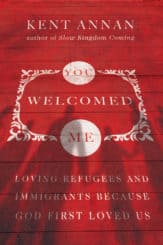
I’ll admit I’m tired of hearing about the border wall every day. Depending on the news outlet, someone is either lamenting the separation of children from parents, tear gas, and the loss of America’s compassion and generosity; or spitting mad about the loss of America’s jobs, safety, and identity.
I’m learning to examine my heart before responding to political opinions and accusations about hot topics like the border wall. Kent Annan’s new book, You Welcomed Me: Loving Refugees and Immigrants Because God First Loved Us, has been a very helpful guide.
When I received this book, with its warm red cover depicting a welcome mat and the shadows of a family, I knew I couldn’t gift this book to some of my friends because it would be seen as a political maneuver instead of a tool for spiritual development. But You Welcomed Me does not play into the emotional melodrama we’re accustomed to in today’s media. It’s not fluff or propaganda. It’s facts about immigration, and the questions we’re all wrestling with, and biblical wisdom guiding us toward healthy, just, merciful action.
Kent helps us ask and explore:
- Can we be wise and welcoming?
- Can we be generous and have security?
- Can we ask serious questions with respect?
- Can we navigate tough political questions guided by love for God and neighbor?
- Can we find the best practical ways to welcome, help, and advocate for refugees and immigrants?
Readers familiar with Kent Annan have come to expect this approach. Kent humbly shared his struggles about living for and with the poor in Haiti in his first book, Following Jesus Through the Eye of the Needle. He revealed our universal doubts and lament in After Shock, struggling with the devastating consequences of the deadly 2010 Earthquake in Haiti. He invited us to join him in his mindful, intentional decisions to do justice and love mercy in Slow Kingdom Coming. Kent does all this without hysteria, shame, or mind games. He’s a clear and gentle author.
You Welcomed Me dives deeper into the five practices Kent introduces in Slow Kingdom Coming—attention, confession, respect, partnering and truthing. Kent summarizes the histories, questions, and common assumptions about our country’s immigration and refugee policies with facts, questions, and ideas for taking small next steps.
For example, many people don’t know the definitional difference between a refugee and an immigrant. Kent includes this kind of information in the book:
“An immigrant is someone who has moved to another country for reasons that could include fleeing violence, natural disaster, or extreme poverty. They could be reuniting with family or looking for education or opportunity for themselves and their families. Refugees are a category of immigrants that have fled under special circumstances.”
Kent includes facts, figures, and definitions that equip readers to understand problems, even when they are tricky. I love that Kent doesn’t shy away from the questions we hear in the media about immigrants and refugees, in his chapter called “Real Concerns.” Are they really safe? Will they take our jobs? Will they assimilate?
“Any violent events that appear related to immigrants and refugees can work on the public imagination like shark attacks, stoking fear in the majority culture. Actually, the likelihood of being attacked by a shark (1 in 3,748,067) or by lightning (1 in 79,749) or heart disease (1 in 5) are much, much higher than the odds of being an American killed by a refugee terrorist attack (1 in 3.64 billion).”
Stories, not facts, are what change minds and hearts. The media seizes stories to propel us toward acting in the ways their sponsors desire—immigrants are murdering rapists, or immigrants are suffering saints. But neither of the generalizations are accurate:
“Jesus told us to love our neighbors as ourselves. This means we cannot flatter refugees or immigrants, even for noble purposes…‘If it is a dehumanizing lie to suggest that all refugees are criminals…it is not less a lie to depict them as hapless victims. My own experiences suggest that refugees are as diverse as any other randomly assembled group of people.’”
Kent encourages us to seek out and listen long to the stories of people who are different from us. Every citizen, and every immigrant, has a unique story. What stories do we have in common? What stories will break our hearts? Listening is the first step in welcoming. What we choose to listen to will change us, and, if we choose to act on it, can change our own stories.
Listening is the first step in welcoming. What we choose to listen to will change us, and, if we choose to act on it, can change our own stories.
But what do we do with the facts we study and the stories we hear? Thankfully, Kent provides multiple lists of what we could do, nationally and internationally, in a chapter called “Getting Practical.” You could hire refugees and immigrants in your business, you could advocate for local policy, and you could get out the vote. But you could also:
“…ensure a tone of love by speaking well of the refugees and immigrants we know. We can avoid or call out demeaning language. We can model love in our conversation…Like our actions, words matter. We may have different positions on policy and politics, but our words matter and can be deeply encouraging for people who don’t feel welcomed.”
In addition to practical next steps, Kent provides “Resources and Organizations for Next Steps” in the Appendix. He also offers two free resources online:
- InterVarsity Press and the Humanitarian Disaster Institute created a free 6-session video curriculum for You Welcomed Me that you can use to lead your church, small group, or class through refugee and immigrant issues in a way that is engaging, inspiring, and welcoming for participants from all kinds of political and theological perspectives.
- I was honored to personally work with Kent, IVP and HDI to create a free Family Toolkit that will help you lead your family into discussions, activities, and prayers about these hard topics in a welcoming, grace-filled way.
Kent wrote this book to spur us on toward wise, loving action. If you are exhausted by the conflicting media stories you hear about immigration, the border wall, and refugees, please read this practical and accessible book. You Welcomed Me strengthens my resolve to be a wise, thoughtful, and welcoming American Evangelical Christian.
“We aren’t called first to defend our country’s border or honor, but to seek the kingdom of God. We’re susceptible to seeking comfort, patriotism, war, power, pleasure, success, and so many other things first. We’re susceptible to seeking liberal, libertarian, or conservative stairways to heaven rather than going down on our knees to love, learn, and pray. We don’t want to huddle within the bonds of racism or nationalism, but instead to cross borders into the liberation of God’s kingdom.”
 Aimee Fritz delights in telling long, true stories about compassion, souls, and big mistakes. She recently finished the Family Toolkit for the book reviewed here: You Welcomed Me: Loving Refugees and Immigrants Because God First Loved Us. Previously, she wrote the Family Toolkit for Kent Annan’sSlow Kingdom Coming: Practices for Doing Justice. Loving Mercy, and Walking Humbly in the World.
Aimee Fritz delights in telling long, true stories about compassion, souls, and big mistakes. She recently finished the Family Toolkit for the book reviewed here: You Welcomed Me: Loving Refugees and Immigrants Because God First Loved Us. Previously, she wrote the Family Toolkit for Kent Annan’sSlow Kingdom Coming: Practices for Doing Justice. Loving Mercy, and Walking Humbly in the World.

